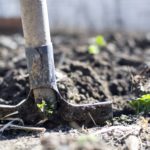As many of you know, I recently returned from a 6-month sabbatical from my work with CCDA. In my absence, our entire staff––but particularly Dave Clark––had to carry a huge load, for which I will be eternally grateful. While my entire sabbatical was filled with fabulous experiences and much needed rest and restoration for my spirit and soul, nothing matched the last 36 days of my time away, which I spent walking across Spain with two of my children, Stefan and Anna.
“I walk in the way of righteousness, along the paths of justice.” –Proverbs 8:20
In early December of 2014, I made the decision to do a 1000-year-old pilgrimage called the Camino de Santiago (the Way of St. James) in northern Spain. I had learned about it from my sister-in-law’s husband and through watching a movie called The Way starring Martin Sheen. (I refer to this movie as the Camino without the blisters.)
While it would be impossible to unpack all of the insights and lessons I learned while on this pilgrimage, I would like to share a few key thoughts that might be helpful for those of you who are committed to walking with Jesus and who are on the journey of walking alongside the poor and marginalized of our nation as an expression of Kingdom ministry.
Since taking this very long walk, I am struck by how often the Bible makes reference to walking, to the way, and to feet when speaking about our relationship with God. Consider one of the most significant claims that Jesus made about himself:
Jesus answered, “I am the way and the truth and the life. No one comes to the Father except through me.” (John 14:6)
 On the Camino, I literally experienced “the way” (Jesus) as I was walking 500 miles––praying, thinking, evaluating my life, remembering scripture, conversing with my children and with strangers who became friends, all while experiencing the pain of taking one step after another, mile after mile on the rocky, uneven road that is much of the Camino.
On the Camino, I literally experienced “the way” (Jesus) as I was walking 500 miles––praying, thinking, evaluating my life, remembering scripture, conversing with my children and with strangers who became friends, all while experiencing the pain of taking one step after another, mile after mile on the rocky, uneven road that is much of the Camino.
I gained new insight into the reality that those of us who have chosen to walk with the poor in our neighborhoods have also chosen a Camino filled with pain and extreme challenge.
Even more painful is the realization that while many of us have made a choice to incarnate our lives alongside our neighbors, most of our neighbors have no choice at all about where they live.
Jesus radically enters our human reality by making the journey from heaven to live on the margins of Jewish and Roman society as a Galilean Jew. He and his parents are forced to walk to Egypt to escape certain death. Jesus walks along the shores of Galilee teaching about the Kingdom and touching lives that no one else would touch. Then, He willingly took the long, lonely and painful walk to Golgotha to be executed––not only alongside criminals but also as one accused of being a dangerous criminal himself––to redeem all of humanity.
This Jesus invites us to become people of the Way (His people), willing to enter into the pain and suffering of those we do life with in the barrios and ‘hoods of our world in order to experience His redemption and resurrection power.
In reality, the Camino de Santiago is a way for those of us who are rich and wealthy (I met very few poor people on the Camino) to manufacture an experience that allows us to endure a little bit of pain in pursuit of spiritual insight or grand adventure. While I view the completing of this journey a great accomplishment for me as a 55-year-old pilgrim, I am far more impressed with the men, women and children who’s survival requires them to walk even thousands of miles to flee war, famine and persecution every day. I am far more impressed with the journey that many of you have chosen to live and walk in some of the most marginalized neighborhoods of our nation because of your faith.
Many of us in CCDA may never get the opportunity to walk the Camino de Santiago, but we are all on a much more significant Camino—walking with God alongside our neighbors, working together to be agents of love, justice, redemption and hope. In the end, we do not offer programs or propositions as the solutions to peoples pain and longing, but we bring Good News: that Jesús from Galilee invites us to enter the Way of abundant and eternal life through Him, and that He will never leave us or forsake us.
We are on the Camino of life.
We are on the Camino seeking justicia (righteousness and justice).
We are on the Camino, walking with God and with one another to be agents of His love.
We are on the Camino filled with pain and suffering (for a little while), knowing and believing that one day soon all things will be made new for His glory.




